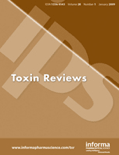
Toxin Reviews
metrics 2024
Illuminating the Impact of Toxins on Health
Introduction
Toxin Reviews is a premier academic journal focused on the critical field of Toxicology, published by Taylor & Francis Inc. Established with an aim to foster research and disseminate knowledge, this journal has been pivotal since its inception in 1982 and continues to be a leading platform for both emerging and established researchers. With an impressive impact factor and ranked in the 75th percentile among its peers in the Scopus categories, it serves as an essential resource for scientists, practitioners, and students interested in understanding the complexities of toxins and their effects on health. The journal provides an Open Access platform, enhancing visibility and accessibility of research findings to a broader audience. Covering a wide scope, Toxin Reviews plays a vital role in bridging gaps between toxicological research and practical applications, ensuring that rigorous scientific inquiry translates into real-world solutions.
Metrics 2024
 0.55
0.55 3.30
3.30 3.20
3.20 54
54Metrics History
Rank 2024
Scopus
IF (Web Of Science)
JCI (Web Of Science)
Quartile History
Similar Journals

Toxicology and Environmental Health Sciences
Transforming Knowledge into Action for a Safer EnvironmentToxicology and Environmental Health Sciences is a peer-reviewed journal published by the Korean Society for Environmental Risk Assessment & Health Science, dedicated to advancing the fields of toxicology and environmental health. With an ISSN of 2005-9752 and E-ISSN 2233-7784, this journal serves as a vital platform for researchers, professionals, and students seeking to explore the intricate relationships between environmental risks and public health. Operating from South Korea, it has a converged years span from 2009 to 2024, and currently holds a respectable Q3 quartile ranking in both Health, Toxicology and Mutagenesis and Toxicology. This positions the journal within a critical space for those invested in understanding and mitigating environmental health challenges. Although not an open-access journal, it continues to foster high-impact research, contributing to a better understanding of toxicological sciences and environmental health dynamics. Engage with the latest findings and discussions that shape this evolving field through the insightful articles published herein, reinforcing its importance as a resource for scholars and practitioners alike.

Toxins
Fostering collaboration in the fight against environmental toxins.Toxins, published by MDPI, is a leading open-access journal specializing in the field of toxicology, with a strong emphasis on the health implications of toxins across various environments. Established in 2009, this journal has quickly ascended to prominence, attaining a Q1 ranking in both the Health, Toxicology and Mutagenesis and Toxicology categories, underscoring its significant contribution to the scientific community. With an impressive Scopus ranking, placing it within the top percentile of related fields, Toxins serves as a vital resource for researchers, professionals, and students dedicated to advancing knowledge in toxicology and environmental health. The journal encourages the open dissemination of innovative research and critical reviews that explore the mechanisms, effects, and management of toxic substances, thus ensuring that vital research outcomes reach a global audience. For those looking to keep abreast of cutting-edge developments in the field, Toxins is an indispensable platform for scientific exchange and collaboration.
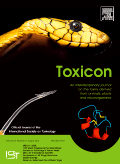
TOXICON
Championing Excellence in Toxicological ScholarshipTOXICON is a prominent peer-reviewed journal dedicated to advancing the field of toxicology and its related disciplines. Published by PERGAMON-ELSEVIER SCIENCE LTD, this journal has been a crucial resource for researchers since its inception in 1962, with a focus on disseminating high-quality research until 2024 and beyond. TOXICON features comprehensive studies spanning the biochemical, biochemical, and regulatory aspects of toxology, making it essential for researchers, professionals, and students alike. With a current impact factor that places it in the Q3 category of Toxicology and a Scopus rank of 67 out of 133 in its field, it serves as a valuable platform for innovative findings and discussions. Although it does not offer open access options, TOXICON's rigorous editorial standards ensure that published work meets the highest scholarly criteria, thereby enhancing its contribution to toxicological science.
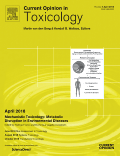
Current Opinion in Toxicology
Empowering Professionals with Timely Toxicology InsightsCurrent Opinion in Toxicology is a premier academic journal published by Elsevier, focusing on the latest advancements and perspectives in the field of toxicology. With an impressive impact factor reflecting its high citation and influence within the research community, this journal ranks in the Q1 category for Toxicology, positioned at #8 out of 133 in the Scopus Toxicology domain, placing it in the 94th percentile. The journal aims to provide concise and insightful reviews of contemporary research, fostering an understanding of critical issues related to toxic effects of chemicals and environmental agents. Although not an open access journal, it attracts a worldwide readership, making it an essential resource for researchers, professionals, and students committed to understanding toxicological science. Based in the Netherlands, Current Opinion in Toxicology serves as a platform for stimulating scholarly dialogue and guiding future research directions in this vital area of study.

Mycotoxin Research
Exploring the Hidden Dangers of MycotoxinsMycotoxin Research, published by Springer Heidelberg, is a vital interdisciplinary journal dedicated to the exploration and study of mycotoxins, their impacts on health and environment, as well as strategies for mitigation. With a solid presence in the fields of Biotechnology, Microbiology, and Toxicology, it has earned a respectable Q3 ranking and continues to facilitate the dissemination of impactful research from 1985 through to 2024. The journal caters to a diverse audience, including researchers, professionals, and students, providing a platform for original research articles, reviews, and case studies that contribute to the understanding and management of mycotoxins. Although it does not offer open-access options, the journal remains a critical resource, engaging its readers with cutting-edge findings and advancements that shape the future of health and safety regarding mycotoxin exposure. With Scopus rankings reflecting its relevance—44th in Toxicology, 113th in Biotechnology, and 71st in Microbiology—Mycotoxin Research stands as an essential publication for anyone dedicated to advancing knowledge in these critical scientific domains.

Toxicon-X
Connecting Global Researchers in ToxicologyToxicon-X is a prestigious journal published by ELSEVIER, specializing in the dynamic field of toxicology. With an impact factor indicative of its excellence and rigor—ranked Q1 in Toxicology as of 2023, and positioned at #40 out of 133 in Scopus's Pharmacology, Toxicology, and Pharmaceutics category—this journal is a vital resource for researchers, practitioners, and students alike. Since its inception in 2019, Toxicon-X has embraced an Open Access model, enhancing accessibility and transparency of research findings. This ensures that crucial studies on toxic agents and their effects reach a broader audience, driving advancements in public health and safety. The journal is based in the United Kingdom and caters to a diverse international readership, with its scope encompassing novel research, reviews, and insights into emerging toxicological challenges. As we move towards the 2024 convergence year, Toxicon-X remains committed to fostering a deeper understanding of toxic substances, their mechanisms, and implications for human and environmental health.
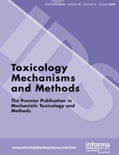
TOXICOLOGY MECHANISMS AND METHODS
Pioneering the future of toxicological science.TOXICOLOGY MECHANISMS AND METHODS is a distinguished peer-reviewed journal dedicated to the advancement of toxicological research, published by Taylor & Francis Ltd. With its ISSN 1537-6516 and E-ISSN 1537-6524, this esteemed journal features critical studies and innovative methodologies in the field of toxicology, aligning with its mission to enhance understanding of biological mechanisms and risk assessment. The journal holds a commendable Q2 ranking in both the Health, Toxicology and Mutagenesis, and Toxicology categories, as well as strong positions in Scopus rankings, reflecting its influence with a 71st percentile rank in Toxicology and a 69th percentile rank in Environmental Health. Researchers, professionals, and students in the toxicology domain will find this journal to be an invaluable resource, offering open access options that foster widespread dissemination of its findings. Since its inception, encompassing converged years from 1991 to 1995 and from 2002 to 2024, the journal remains at the forefront of critical discourse and innovative research methods, making it a vital platform for advancing toxicological science globally.

TOXICOLOGY
Elevating research in toxicology to safeguard public health.TOXICOLOGY, published by Elsevier Ireland Ltd, is a prestigious peer-reviewed journal specializing in the field of toxicology. With an ISSN of 0300-483X and an E-ISSN of 1879-3185, this journal provides a vital platform for researchers, professionals, and students to disseminate and access groundbreaking studies from 1973 to present, with a convergence set until 2024. Recognized for its high impact, it holds a Q1 ranking in Toxicology category and ranks #18 out of 133 in Scopus's sector of Pharmacology, Toxicology, and Pharmaceutics, placing it in the 86th percentile. While the journal is not open access, it nonetheless offers a rich collection of research articles that enhance the understanding of toxicological science and its applications. The journal's objectives encompass advancing knowledge in the toxicological evaluation of substances, promoting safety in public health, and fostering dialogue among scholars. As a key resource in the field, TOXICOLOGY plays a crucial role in advancing research and informing practices related to toxicological risks and safety assessments.
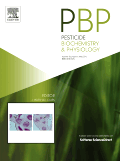
Pesticide Biochemistry and Physiology
Championing high-quality research for food security and environmental safety.Pesticide Biochemistry and Physiology, published by Academic Press Inc Elsevier Science, is a prominent peer-reviewed journal dedicated to advancing knowledge in the fields of agronomy, crop science, and the toxicological effects of pesticides. With an established history since 1971, this journal aims to provide a platform for researchers and professionals to share groundbreaking studies that bridge the gap between agricultural practices and environmental health. Holding a remarkable Q1 ranking in both Agronomy and Crop Science as well as Health, Toxicology, and Mutagenesis, it reflects the journal's commitment to high-quality research. The journal is essential reading for anyone involved in the sustainability of agricultural ecosystems, offering insights into the biochemical interactions of pesticides and their physiological impacts on various crops and non-target organisms. As the global demand for sustainable agricultural practices escalates, Pesticide Biochemistry and Physiology remains at the forefront, promoting innovative research to ensure both food security and environmental safety. Converged through an extensive range of studies, this journal is a valuable resource for researchers, professionals, and students aiming to make significant contributions to the evolving landscape of pesticide biochemistry.

Toxicology Research
Pioneering research in toxicology and mutagenesis.Toxicology Research is a distinguished journal dedicated to advancing the field of toxicology through the dissemination of high-quality research. Published by Oxford University Press, this UK-based journal focuses on critical aspects of toxicology and mutagenesis, highlighting both environmental and pharmacological implications. With an ISSN of 2045-452X and an E-ISSN of 2045-4538, it serves as a valuable resource for researchers, professionals, and students alike. Currently categorized in the Q3 quartile for Health, Toxicology and Mutagenesis, as well as Toxicology in 2023, Toxicology Research maintains a visible presence in Scopus rankings, positioning itself within the targeted professional community. Although the journal operates without open access options, its importance in contributing to scientific discussions and policy formation is undeniable. Covering content from 2012 to 2024, it continues to provide insights into contemporary toxicological challenges, thereby fostering interdisciplinary collaborations and informing best practices in health and safety.